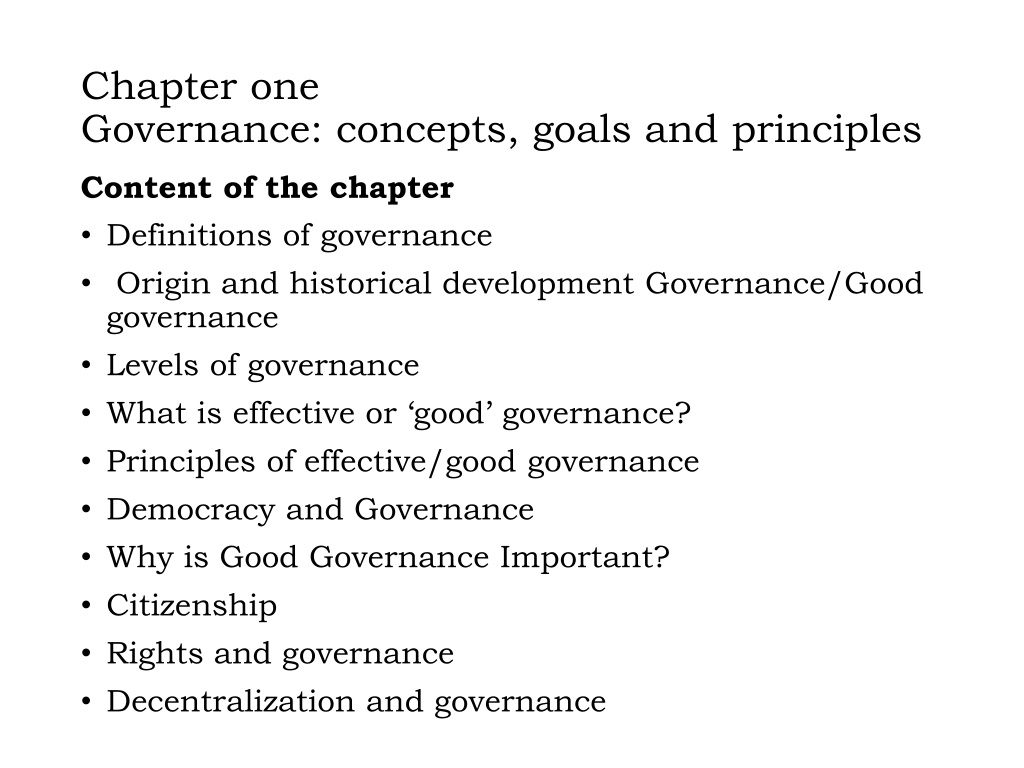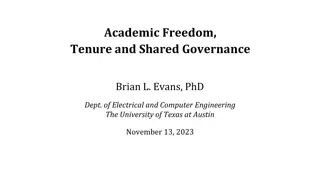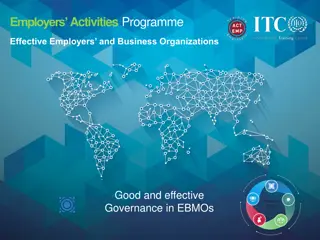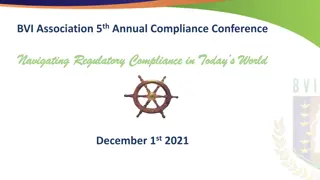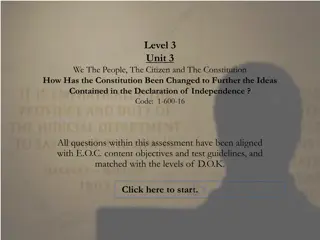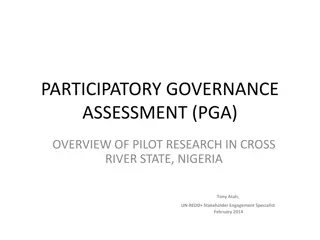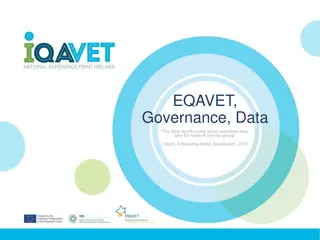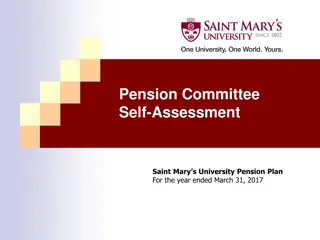Understanding Governance: Concepts, Principles, and Importance
Governance encompasses decision-making processes involving stakeholders, impacting how people lead their lives. Various definitions from organizations like the World Bank and UNDP highlight governance as how authority is exercised, resources managed, and citizens participate in decision-making. Good governance emphasizes efficiency, accountability, and citizen empowerment for effective management at all levels.
Download Presentation

Please find below an Image/Link to download the presentation.
The content on the website is provided AS IS for your information and personal use only. It may not be sold, licensed, or shared on other websites without obtaining consent from the author. Download presentation by click this link. If you encounter any issues during the download, it is possible that the publisher has removed the file from their server.
E N D
Presentation Transcript
Chapter one Governance: concepts, goals and principles Content of the chapter Definitions of governance Origin and historical development Governance/Good governance Levels of governance What is effective or good governance? Principles of effective/good governance Democracy and Governance Why is Good Governance Important? Citizenship Rights and governance Decentralization and governance
Brainstorming - What is governance? - Is it possible to have governance without government? (debate).
Definitions of governance The concept of governance is a catch-all term for often messy, unpredictable and fluid processes. It is a slippery term with multiple definitions, depending on the agency using the term or the context in which it is used. However, put simply, governance refers to decision-making by a range of interested people, or stakeholders including those in formal positions of power and ordinary citizens. These decisions have a huge impact on the ways in which people (i.e. women and men) lead their lives.
Cont However, the reality is that not all stakeholders have the required power or leverage to influence decisions and hold decision-makers to account. Some definitions of governance The World Bank: Governance is the traditions and institutions by which authority in a country is exercised for the common good. This includes i. the process by which those in authority are selected, monitored and replaced, ii. the capacity of the government to effectively manage its resources and implement sound policies, and iii. the respect of citizens and the state for the institutions that govern economic and social interactions among them.
Cont The Asian Development Bank: Governance is the manner in which power is exercised in the management of a country s social and economic resources for development. Government means the way those with power use power UNDP: Governance is the exercise of political, economic and administrative authority in the management of a country s affairs at all levels. So, governance comprises the complex mechanisms, processes and institutions through which citizens and groups articulate their interests, mediate their differences and exercise their legal rights and obligations.
Cont CIVICUS(World Alliance for Citizen Participation): Participatory governance is about empowering citizens to participate in processes of public decision-making that affect their lives. So in general from the above definitions we can understand that: The World Bank and the Asian Development Bank emphasize efficiency of processes and resource management.
Cont In contrast, the United Nations Development Program s (UNDP s) conceptualization of governance builds on an understanding of governance rooted in social justice and rights and Not referring to governance institutions as holders of power, but rather as enablers of equitable decision-making and accountability, and of greater citizen involvement. In turn, CIVICUS (World Alliance for Citizen Participation) brings the focus around to citizens and the need for a participatory approach to governance which is ultimately about achieving equitable power-sharing in governance processes
Origin and historical development Governance/Good governance The concept of Governance is not new. It is as old as government itself. Both the terms are derived respectively, from the old French words gouvernance and governement.
Levels of governance Governance happens at five interconnected levels household, community, Local/regional, national government, and global governance/institutions. The institutions and actors involved in governance processes vary according to the level.
What is effective or good governance? Good governance means creating well-functioning and accountable institutions political, judicial and administrative which citizens regard as legitimate, in which they participate in decisions that affect their daily lives and by which they are empowered. governance as being about processes of decision-making, mechanisms and management, while good or effective governance refers to the quality of these processes, judged against a set of governance principles.
Cont But due to contradictory nature of local culture, social and political contexts there difference in concepts of good governance. Eg. World Bank see governance that promotes efficiency in financial management and administration For others, governance is only effective if it promotes social justice and equality and realization of rights for all citizens . Here governance can only be effective if it focuses on achieving social justice and gender equality and that gender equality in society enables more effective governance.
Brainstorming Based on your opinion list principles of good governance and discuss on them (group discussion)
Accountability accountability means taking responsibility for the outcomes of decisions made, and being answerable for failures to meet expectations. Accountable governance means that those involved in governance decision-making in the public and private sector are expected to adhere to publicly agreed standards, norms and goals. CSOs at local, national and international levels are often expected to play a key watchdog role in these accountability processes.
Cont Accountability can be categorized in terms of horizontal, and vertical/social mechanisms. Horizontal accountability is a method or capacity towards structure accountability that relies on institutions such as legislature (parliament or congress) and the judiciary Horizontal accountability normally refers to internal mechanisms within government.
Cont Vertical /Social Accountability usually link citizen and state through formal mechanisms, most obviously through local and national elections. In vertical forms of accountability through which citizens, media, Non-Governmental Organizations (NGOs) and Civil Society Groups (CSG) play directly or indirectly roles in holding the powerful to account. In short Accountability is one of the foundations of good governance.
Transparency Transparency is built on the free flow of information. It also means that information is freely available and directly accessible to those who will be affected by such decisions and their enforcement. It is the provision, which makes it possible for the people to know about the' decision making process of the government. It is also one of the significant elements of the good governance.
Inclusiveness and Equity All men and women have opportunities to improve or maintain their well-being. Inclusiveness is often linked to participation, equity and diversity. Inclusiveness primarily refers to enabling people prone to marginalization including women and participate equally in governance institutions and practices (i.e. in elections, by standing as elected representatives or in other forms of governance planning and administration)
Cont equity refers specifically to the right of all citizens to have an equal say in governance processes, and to benefit equally from their outcomes. decision-making is informed by all voices, including those of the most vulnerable, and that resources are shared in ways that meet everyone s needs. Equity is a goal as well as a principle of governance.
Responsiveness Institutions and processes try to serve all stakeholders. Good governance requires that institutions and processes try to serve all stakeholders within a reasonable timeframe. Responsiveness in governance means acting on the information gathered through participatory processes in ways that benefit all citizens. This means actively listening to what citizens are saying, and providing services and policies that meet their diverse needs.
Participation Participation by all citizens, both men and women are a key cornerstone of good governance. All men and women should have a voice in decision-making, either directly or through legitimate intermediate institutions that represent their interests. representative democracy does not necessarily mean that the concerns of the most vulnerable in society would be taken into consideration in decision making. Participation needs to be informed and organized.
Following the rule of law the rule of law is a necessary foundation for efforts to achieve the goal of good governance. Justice is valued as central in governance.
Effectiveness and Efficiency produce results that meet the needs of society while making the best use of resources at their disposal. sustainable use of natural resources and the protection of the environment (UNESCAP, 2014). have a broad and long-term vision on how to better the process of governance to ensure continued economic and social development.
Consensus Oriented Good governance mediates differing interests to reach a broad consensus on what is in the best interests of the group good governance mediate these different interest base stake holders in case of conflict of interest. Discussion. So, Do you think there is a good governance in our country based on the above principles?
Discussion Why Good Governance is Important? Discuss for five minute in a group.
Why Good Governance is Important? Good governance is about the processes for making and implementing decisions. It s not about making correct decisions, but about the best possible process for making those decisions. Good governance is important for several benefits. Good governance creates a strong future for an organization At its core, governance is about leadership
Cont effective governance will improve the organization s results, both financial and social, and make sure the owners' assets and funds are used appropriately. While Poor governance vis-a-vis Governance is how an institution is ruled; it is how the authority, responsibility, and controls are required in the institution.
Cont Governance is relevant to any institution, small or large; for profit or not; extending from a single family all the way to global institutions that have an impact on our lives. Hence, governance is relevant for humanity for quality of life now and for its sustainability in the future. In the absence of democracy, peace and good governance, sustainable socio-economic progress is not possible.
Cont The good governance is a prerequisite for human development and governance It has been widely accepted now that the main reasons for human deprivation are not just economic. There are social and political factors too rooted in poor governance. It has rightly been pointed out that the good governance means political pluralism with free and fair elections Reduce invest on military preparation and infrastructure and war and much more on education, health and basic amenities.
Cont It means fighting the graft and nepotism. to ensure that the funds of the state are utilized on the development of human and productive areas instead of non-human and non-productive areas. In short, governance is about performance. Thus, the governance in any society, aims to ensure transparency through the exercise of economic political and administrative authority.
Cont. It basically strives to establish quality relationship between the rulers and the ruled. In the context, governance point out to the nature of mutual interaction among social actors as well as between social actors and public administration, and it contains the meaning of ruling together.
Democracy and Governance Discussion What is democracy? What is democratic governance and what are the characteristics of democratic governance? Is democracy best way of governance for gender equality? Debate!!
Cont Some definitions of democracy emphasize the processes that underpin democratic governance; i.e. fair, competitive elections and freedom of speech and information. Others view democracy more broadly in terms of civil and political rights and the distribution of power in society. Democracy is an essential prerequisite of good governance. A democratic government may also face crisis of governability, however, a democrat system is essential.
Cont The good governance is a situation where there is a mutual trust between the state and the citizen. Relatively, it is very essential to give emphasis on the democratic form of governance. The government must have participation from the citizenry; both men and women in the society The most recent Universal Declaration on Democracy adopted by the Inter-Parliamentary Union (IPU) in 1997 stated that: democracy is based on the core principles of participation and accountability.
Cont the right of citizens, including the most disadvantaged groups, to influence their governments and criticize governing bodies without fear of punishment; and freedom of speech, information and the media. Significantly, the Universal Declaration states that democracy presupposes a genuine partnership between men and women in conducting the affairs of society (IPU). there is often a large discrepancy between the way governance institutions talk about democracy and the way democratic principles are applied.
Cont democracy is rejected by some because of the extent to which it has been shaped by European and American thought. It should also not be assumed that democracy result in greater gender equality it is an important foundation but not the only contributing factor E.g.in China women s numerical participation in village committees has declined since elections were introduced.
Rights and governance In light of the IPU s Universal Declaration on Democracy there has been renewed recognition by those promoting governance processes of the need to protect human rights (Grugel and Piper 2007: 12). These include economic rights and the right to security, as well as equality, and are laid out in UN Declarations and Conventions, including CEDAW. Some organizations such as CIVICUS promote a rights-based approach to governance.
Cont CIVICUS adopts a rights-based approach to development and governance it seeks to promote basic human rights (including freedoms of association, information and expression), the right to essential services (such as water and education) and
Cont citizens rights, including the right of all women and men to participate in the decisions that affect their lives and the right to expect and to ensure that government acts in the best interests of the people . Its participatory governance program places special emphasis on the rights and participation of women, children, disabled people and other traditionally marginalized groups.
Decentralization and governance Democratic decentralization entails the increasing responsibility of lower level authorities at local levels over resources and bureaucratic tasks, a means to achieving greater efficiency quicker and more relevant to local needs, improving transparency and ownership greater gender equality in decision-making. However, quality of their participation???? but sometimes has the potential to further entrench power inequalities(negative consequence for women)
Social justice and citizen-led governance processes greater emphasis on enabling ordinary people at all levels e-governance system CIVICUS use the term participatory governance As part of their watchdog role CSOs are viewed as key actors in implementing and monitoring these participatory processes, as well as mediators Yet whether these participatory processes amplify the voices of marginalized people in reality is debatable.
Individual assignment Concept Paper:(5%) Write up two-page concept paper on the issues discussed in chapter 1. submit the assignment within one week.
Chapter two: Governance through a gender lens Content of the chapter: Roots of gender imbalance in governance Social roots of gender inequality in governance Why does governance need to be gender sensitive? What is gender sensitive governance? Practical approaches to gender sensitive governance
Brainstorming Why is it crucial to analyze governance institutions and processes from a gender perspective? Discuss some government failure in governance through its process to made gender sensitive governance.
gender-sensitivity in current governance institutions and processes despite governance reforms, there has been a fundamental failure to challenge entrenched unequal gendered power relations and other forms of exclusion that have been inbuilt in governing processes and institutions. There are different indicators for this. some indicators/markers include:
1. Gender imbalance in decision-making Even though electoral quota systems and the establishment of women s ministries have resulted in some progress However, there are still far fewer women than men in decision-making positions at global, national and local levels of governance including the micro-levels of the community and household.
2. Women are not treated equally in governance institutions and processes Even when women are actively involved in governance, their struggle for equal treatment and recognition is not over. confined to softpolicy areas such as health and education.
3. Governance institutions fail to take women s double burden into account Inflexible working condition additional caring responsibilities
4. Governance policies fail to challenge gender inequalities and to take the different needs of men and women into account As a result of these inequalities in decision- making, governance policies often remain blind to the different needs of men and women. E.g. - trade policy led by the WTO has effect on women and other marginalized groups - At the local level, services such as the provision of health, water and education often still fail to meet the needs of women and men.
5. Poor institutional accountability on gender equality and women s rights Lack of institutions commit to gender equality in their policies and practices including internationally ratified agreements like; CEDAW There are many reasons for this, including:- inflexibility within the institution, but a major factor is often that there are no clear mechanisms in place to ensure that gender equality remains a priority and gender equality may not be an indicator against which the performance of governance actors is assessed.
